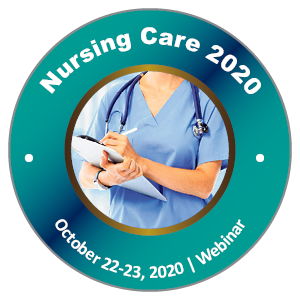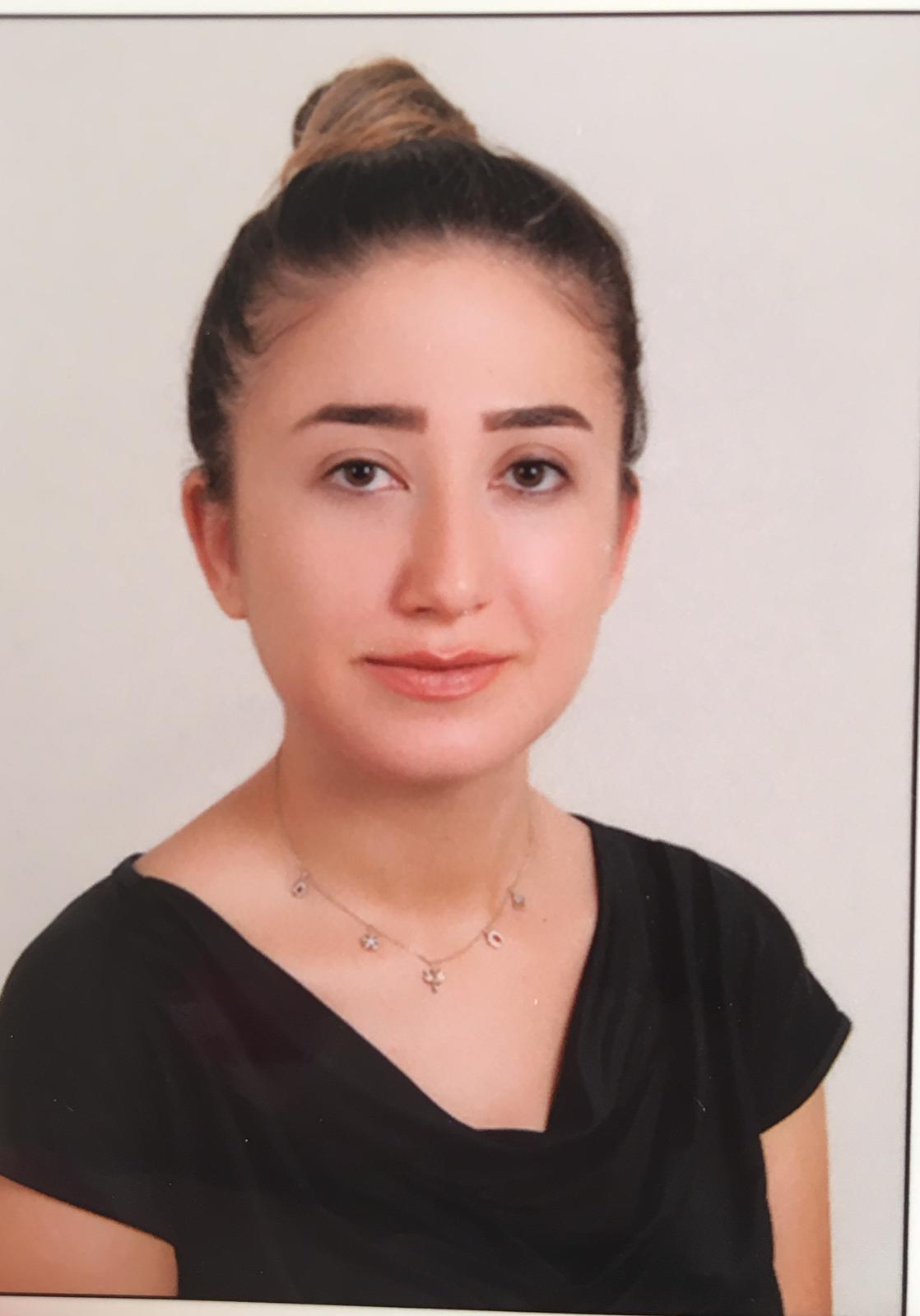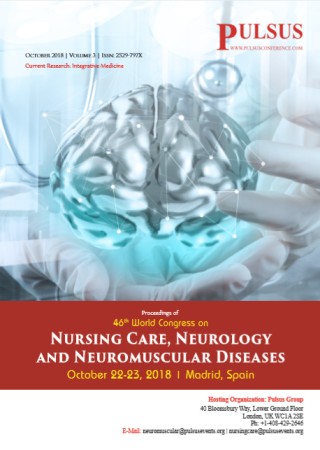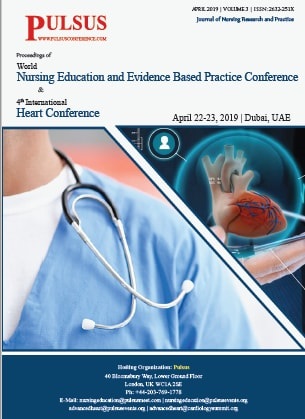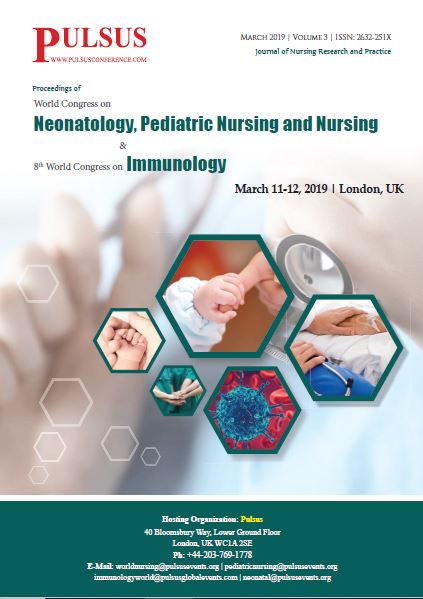Renowned Speakers
We’ve invited the top most influential speakers from around the world to give inspirational talks and lead practical workshops.
Conference Information
About Conference
Pulsus Group invites all the participants from across the globe to attend “48th Global Congress on Nursing Care and Research” during October 26-27, 2020. This includes proficient keynote presentations, verbal speeches, productive poster presentations and exhibitions.
Nursing Care 2020 provides a worldwide stage to worldwide systems administration and trading most recent developments in nursing and healthcare. Offering opportunity to go to the presentations conveyed by eminent experts from everywhere throughout the world. Participating in Nursing Care 2020 gives an approach to meet, cooperate with, and make contacts with different specialists in your claim to fame region. Most meetings will have creators, analysts, or clinicians who are perceived specialists in the field. Nursing conferences unite people who have an enthusiasm for various fields of nursing like psychiatric, cancer, cardiac, critical care, adult & women health, legal, pediatric and emergency nursing, midwifery, public health, healthcare and medicine from practice, research, administration, policy and education.
Scope and Importance :
Nursing Care 2020 intent is to discover advances in health practice, management and education in relation to health disparities as well as a breadth of other topics. According to the reports, total health care spending of Italy is 9.3% of GDP according to 2015, less than the EU weighted average of 9.9%, and much less than in Germany (11.1%), Sweden (11.1%) and France (11.0%). More than three-quarters (76%) of health purpose expenditure in Italy is publicly-funded, which is slightly less than the EU average (79%) and estimated increase of 10.5% by 2017 in Italy. Estimated healthcare expenditure of Brazil is $309millions Healthcare expenditure of America is $89.2 billion and expected to increase to $101.8 billion by 2017. Health care expenditure of Europe is $152.2 billion and expected to increase to $180.8 billion by 2020.
Who Should Attend?
• Nurse Practitioners
• Registered Nurses
• Nurses
• Nurse Associations
• Physicians
• Healthcare Scientists and Professors
• Health Care Researchers
• Doctors
• Pediatricians
• Surgeons
• Hospital Nurse staff
• Faculty of Nursing
Why to Attend???
Nursing conferences provide a worldwide platform for sharing information and ideas and keeps on updating about the latest innovations and advancements in nursing care and education. It is an immense Opportunity to attend the presentations delivered by Proficient Scientists from all over the world.
Attendees can:
- Take advantage of opportunities to learn about nursing education research from a variety of oral and poster presentations.
- Meet and network with nurses ranging from students to deans, faculty, and researchers.
- Take advantage of opportunities to collaborate with nurses from around the world.
- Attend prominent plenary sessions about relevant issues affecting nursing education
Benefits:
- Accepted abstracts will be published in Journal of Nursing Research and Practice.
- Global networking: In transferring and exchanging Ideas
- A Unique Opportunity for Advertisers and Sponsors at this International event
- Conference Opportunities
For Researchers and Faculty Members:
- Speaker Presentations
- Poster Display
- Symposium hosting (4-5 member team)
- Workshop organizing
For Universities, Associations & Societies:
- Association Partnering
- Collaboration proposals
- Academic Partnering
- Group Participation
For Students and Research Scholars:
- Poster Competition
- Young Researcher Forum (YRF Award to the best presenter)
- Student Attendee
- Group registrations
For Business Delegates:
- Speaker Presentations
- Symposium hosting
- Book Launch event
- Networking opportunities
- Audience participation
For Product Manufacturers:
- Exhibitor and Vendor booths
- Sponsorships opportunities
- Product launch
- Workshop organizing
- Scientific Partnering
- Marketing and Networking with clients
Scientific Sessions
PULSUS extends its invitation to attend “Global Congress on Nursing Care and Research” during October 22-23, 2020
Nursing Practice
Nursing is a science, as well as a fine art of Care. It is a complex ever changing profession with ethics, standards, and prime practices to improve your quality of care. Nurses are trained to tailor their practices and give patients care that suits their comforts and needs. The nursing practice involves core involvements with research development, implementation and analysis. Improving patient safety by improving quality in nursing care is the main component of their practices with specialized knowledge, skill, and independent decision making.
Related Societies: The European Specialist Nurses Organisations (ESNO), The British Nursing Association (BNA), Delaware Nurses Association (DNA), The Hawai‘i Nurses' Association, The National Association of Hispanic Nurses, Academy of Medical-Surgical Nurses, Academy of Neonatal Nursing, American Association of Nurse Practitioners, American Academy of Nursing, American Association of Heart Failure Nurses
Nursing Types
Each specialized sector of nursing courses will bring in specialized knowledge and skills to healthcare teams and workplaces. There are different types of Nursing like Registered Nurse, Nurse Practitioner, Nurse Practitioner (grand parented), Employed Student Nurse, and Licenced Graduate Nurse. Apart from these there are many more types of nursing specializations which can be done on a certification basis like, Cardiovascular Nursing, Emergency Nursing, Gastroenterology Nursing, Gerontological Nursing, Hospice Palliative Care Nursing, Oncology Nursing, Rehabilitation Nursing, and many more. All these are processed with a bachelor’s master’s and doctoral programs depending on the individual’s interest
Related Societies: Association of Women’s Health, Obstetric and Neonatal Nursing, Gerontological Advanced Practice Nurses Association, International Society of Nurses in Cancer Care, Midwest Nursing Research Society, National Association of Directors of Nursing Administration in Long Term Care, National Association of Nurse Practitioners in Women’s Health, National Association of Pediatric Nurse Practitioners
Nursing Education and Management
Nursing Education is a practical and theoretical training to the nurses and prepares them for their professional duties. The training and education is taught by experienced nurses and medical professional who are qualified in the respective fields. The courses range from general nursing to mental health nursing, pediatric nursing, post-operatory nursing, and many more. Various Universities offer Bachelor’s, Master’s, Doctorates and Diploma courses in Nursing
Related Societies: Society of Urologic Nurses and Associates (SUNA), Society of Pediatric Nurses, European Federation of Critical Care Nursing Associations, European Honour Society of Nursing and Midwifery, Federation of European Nurses in Diabetes, European Dialysis and Transplant Nurses Association, French Nursing Research Association , Hellenic Nurses Association.
Health Care
Diagnosis, treatment and prevention of diseases, illness, injuries and various physical and mental ailments in humans constitute healthcare. It is an important sector in promoting general, physical, mental health and well-being of people around the world. Healthcare is initiated by providing the primary, secondary, and tertiary care for the public health. The healthcare sectors are dedicated in providing healthcare services and products through group of trained and experienced professionals from interdisciplinary teams.
Related Societies: The National Council for the Professional Development of Nursing and Midwifery, Swedish Society of Nurses and Technicians in Cancer Care, Swiss Community of Interests in Intensive Care Nursing (IGIP - CISI - CICI), Turkish Association of Critical Care Nurses, Hellenic Nurses Association, Finnish Society of Intensive Care, Czech National Association of Nurses
Pregnancy & Midwifery
Midwives are well suited, trained health professional to provide prenatal care during labor and birth and care after birth. They have additional training and credentials for childbirth nursing education, breastfeeding consultation, and/or doula care. Midwives deliver babies at the hospitals or home depending on the customer’s expectation and severity of the pregnant women. Apart from providing care to women during pregnancy, birth, and postpartum period, they may also provide primary care related to reproductive health, including annual gynaecological tests, family planning, and menopausal care. They are specialists in pregnancy, childbirth, postpartum, and well-woman health care
Related Societies: The European Specialist Nurses Organisations (ESNO), The British Nursing Association (BNA), Delaware Nurses Association (DNA), The Hawai‘i Nurses' Association, The National Association of Hispanic Nurses, Academy of Medical-Surgical Nurses, Academy of Neonatal Nursing, American Association of Nurse Practitioners, American Academy of Nursing, American Association of Heart Failure Nurses
Cancer Nursing
Oncology nursing is one of the most challenging and rewarding fields in nursing. Cancer nursing is all about stretching out care and services to the individual’s battling cancer from trained specialized & registered nurses and they are called as Oncology Nurses. The physical conditions, prescribe medication, chemotherapy, radiation and other treatments are monitored by these nurses. They are registered nurses with in-depth knowledge of cancer disease and its treatment side effects too. The crucial part of cancer nursing is educating the patient about the disease, alongside the management, listening to the patient’s emotional concerns and anxieties, and referring them appropriately if needed with a moral support.
Related Societies: Association of Women’s Health, Obstetric and Neonatal Nursing, Gerontological Advanced Practice Nurses Association, International Society of Nurses in Cancer Care, Midwest Nursing Research Society, National Association of Directors of Nursing Administration in Long Term Care, National Association of Nurse Practitioners in Women’s Health, National Association of Pediatric Nurse Practitioners
Heart & Cardiovascular Nursing
Cardiovascular Nursing is a specialized nursing field, where nurses attend individuals suffering with various problems in the cardiovascular system and heart diseases. The cardiac nurses work in many different environments, including coronary care units (CCU), cardiac catheterization , intensive care units (ICU), operating theatres, cardiac rehabilitation centers, Postoperative cardiac wards, clinical research, cardiac surgery wards, cardiovascular intensive care units (CVICU), and cardiac medical wards. Basic Life Support and Advanced Cardiac Life Support are the certifications, the associated nurses should be certified with, and they should be registered nurses. Wide varieties of patients from children to the elderly are helped in surgical or ambulatory settings.
Related Societies: Society of Urologic Nurses and Associates (SUNA), Society of Pediatric Nurses, European Federation of Critical Care Nursing Associations, European Honour Society of Nursing and Midwifery, Federation of European Nurses in Diabetes, European Dialysis and Transplant Nurses Association, French Nursing Research Association , Hellenic Nurses Association.
Pediatric Nursing
A pediatric should have be a registered person, who successfully completed a recognized course of study and practice experience in the nursing care of infants, children and adolescents. They assess, plan and provide nursing care and needs for children who are suffering from a wide variety of conditions including diseases, illnesses and who are recovering from surgery, taking into account their medical, social, cultural and family circumstances. Being able to communicate appropriately with children, parents/guardians are their key role apart from working in conjunction with other healthcare professionals
Related Societies: The National Council for the Professional Development of Nursing and Midwifery, Swedish Society of Nurses and Technicians in Cancer Care, Swiss Community of Interests in Intensive Care Nursing (IGIP - CISI - CICI), Turkish Association of Critical Care Nurses, Hellenic Nurses Association, Finnish Society of Intensive Care, Czech National Association of Nurses
Surgical Nursing
Forming the main backbone of the surgical team, the surgical nurses are trained to be experts in pre and post- operative care procedures. They work in dynamic and challenging environments with key roles in life saving surgical procedures and surrounding care. Sometimes even called as Surgical or an Operating Room Nurse, they will be responsible for educating patients on procedures prior to surgery, adjusting treatment plans, and teaching patients about post-operative self-care. Even doctors rely on these dedicated professionals who touch countless lives, and who bring about positive improvements in the health and welfare of patients and their families. Though it may sound and can be stressful at times, it is ultimately rewarding.
Related Societies: The European Specialist Nurses Organisations (ESNO), The British Nursing Association (BNA), Delaware Nurses Association (DNA), The Hawai‘i Nurses' Association, The National Association of Hispanic Nurses, Academy of Medical-Surgical Nurses, Academy of Neonatal Nursing, American Association of Nurse Practitioners, American Academy of Nursing, American Association of Heart Failure Nurses
Dental Nursing
Dental Care Nursing provides and enables the delivery of oral care for people with an impairment or disability. Apart from the important roles of the dental nurse in organizing care, arranging access, liaison with multidisciplinary teams, supporting the patient, families and careers, follow-on care and delivering strong relevant oral health care messages, their key role will be in learning the importance of holistic, patient centered care. Registered dental nurses work as part of a dental team in a variety of clinical and non-clinical settings, and are responsible for maintaining a safe working environment for both patients and staff.
Related Societies: Association of Women’s Health, Obstetric and Neonatal Nursing, Gerontological Advanced Practice Nurses Association, International Society of Nurses in Cancer Care, Midwest Nursing Research Society, National Association of Directors of Nursing Administration in Long Term Care, National Association of Nurse Practitioners in Women’s Health, National Association of Pediatric Nurse Practitioners
Clinical Nursing
Clinical Nursing consists of nurses who are advanced practice registered nurses in the area of clinical expertise (pediatrics, geriatrics, women’s health, diabetes, oncology, psychiatric, rehabilitation, critical care and emergency room), holding a master’s or doctoral degree. Clinical nurse specialists may also work with research—translating research findings into patient care, evaluating research proposals, overseeing design of evidence-based practice studies, applying research results to practice, or coming up with new evidence-based standards and protocols. They work in supervisory roles and in administrative positions, and provide consulting services in their organization, while others work to improve health care systems. Apart from these, they work in management positions and may also develop or work with a team to develop policies and procedures.
Related Societies: Society of Urologic Nurses and Associates (SUNA), Society of Pediatric Nurses, European Federation of Critical Care Nursing Associations, European Honour Society of Nursing and Midwifery, Federation of European Nurses in Diabetes, European Dialysis and Transplant Nurses Association, French Nursing Research Association , Hellenic Nurses Association.
Nutrition & Health
Nutrition is a science of food and nutrients in body growth, development, maintenance, and its relationship to healthcare. Good supplements of nutrients such as such as proteins, vitamins and minerals form rich nutritional status, which in turn enable us to grow well and enjoy good health. Carbohydrates and fat are good energy yielding foods and they contribute to metabolism and energy requirements. Consumption of nutrients for a better health is available in the form of plant and animal origin. There are body building (meat, milk, poultry, fish, eggs, pulses etc.), energy giving (cereals, sugars, fats, oils etc.) and protective foods (vegetables, fruits, milk, etc.), which supply ample amount of nutrients and health.
Related Societies: The National Council for the Professional Development of Nursing and Midwifery, Swedish Society of Nurses and Technicians in Cancer Care, Swiss Community of Interests in Intensive Care Nursing (IGIP - CISI - CICI), Turkish Association of Critical Care Nurses, Hellenic Nurses Association, Finnish Society of Intensive Care, Czech National Association of Nurses
Women Health Nursing
Women health nursing is a about Women’s Health Nurse Practitioner (WHNP), is a nurse who is specialized in advanced education and clinical experience in women's health care. The nurses’ delivery comprehensive health care to women throughout lifespan, with an emphasis on reproductive and gynecologic health needs. A WHNP individual takes on leadership roles as primary care providers for women and provides focused care in areas like, prenatal and postpartum care, lifespan care through menopause, general wellness and preventive care, reproductive health care, etc.
Related Societies: The European Specialist Nurses Organisations (ESNO), The British Nursing Association (BNA), Delaware Nurses Association (DNA), The Hawai‘i Nurses' Association, The National Association of Hispanic Nurses, Academy of Medical-Surgical Nurses, Academy of Neonatal Nursing, American Association of Nurse Practitioners, American Academy of Nursing, American Association of Heart Failure Nurses
Adult Nursing
An important aspect of nurses is to get the trust and confidence of each patient in improving their quality of life. The Adult nurses care for adult patients who are suffering from a variety of health conditions, ranging from minor injuries and ailments, to acute and long-term illnesses and diseases. Promoting good health and well-being through education and awareness on certain topics such as diabetes, weight loss and quitting smoking. They will work within a multidisciplinary team but will in the main point of contact for patients, often providing the most continuity of care.
Related Societies: Association of Women’s Health, Obstetric and Neonatal Nursing, Gerontological Advanced Practice Nurses Association, International Society of Nurses in Cancer Care, Midwest Nursing Research Society, National Association of Directors of Nursing Administration in Long Term Care, National Association of Nurse Practitioners in Women’s Health, National Association of Pediatric Nurse Practitioners
Legal Nursing
Holding an established code of ethics and conduct, the legal nurses play an important role in the litigation process by bridging the gap between medicine and the judicial system. Apart from within the law firms, they can also consult with a wide range of organizations including insurance companies, pharmaceutical companies, hospitals and other medical-related organizations. They are registered and licensed individuals who implement their expertise, experience, and specialized education to interpret research and analyses the medical-related issues relevant to a legal case or claim. Investigation plays a major role in the world of legal nurse individual.
Related Societies: Society of Urologic Nurses and Associates (SUNA), Society of Pediatric Nurses, European Federation of Critical Care Nursing Associations, European Honour Society of Nursing and Midwifery, Federation of European Nurses in Diabetes, European Dialysis and Transplant Nurses Association, French Nursing Research Association , Hellenic Nurses Association.
Advanced Nursing
A Clinical Nurse Specialist is a specialist at diagnosing and treating ailment in their general vicinity of ability. They are nurses with advanced didactic and clinical knowledge and skills. Clinical Nurse Specialists concentrate on one of three primary claims to fame zones: patients and their families, medical attendant administration, and organization. Whatever is left of the nursing staff looks to the Clinical Nurse Specialist for direction in their practice and help with productivity in the work environment.
Related Societies: The National Council for the Professional Development of Nursing and Midwifery, Swedish Society of Nurses and Technicians in Cancer Care, Swiss Community of Interests in Intensive Care Nursing (IGIP - CISI - CICI), Turkish Association of Critical Care Nurses, Hellenic Nurses Association, Finnish Society of Intensive Care, Czech National Association of Nurses
Community Health Nursing
Community health nursing involves several basic concepts, including the promotion of healthy living, prevention of disease and health problems, medical treatment, rehabilitation, evaluation of community health nursing care delivery and prevention systems, and research to further community health nursing and wellness. Working as a community health nurse is an excellent way to combine a love of nursing and a love of your community. It is the job of a community health nurse to help keep these community health problems under control. They often work in community health centers offering treatment and advice to members of the community. They will also try to educate the community on and work toward preventing common health problems. Communities need these types of nurses for a number of reasons. Most importantly, these nurses – working in conjunction with other healthcare professionals – can help improve the health of a community as a whole. Community health nurses can also help provide necessary care in communities that lack easily accessible healthcare.
Related Societies: The European Specialist Nurses Organisations (ESNO), The British Nursing Association (BNA), Delaware Nurses Association (DNA), The Hawai‘i Nurses' Association, The National Association of Hispanic Nurses, Academy of Medical-Surgical Nurses, Academy of Neonatal Nursing, American Association of Nurse Practitioners, American Academy of Nursing, American Association of Heart Failure Nurses
Veterinary Nursing
Veterinary nurses assist in the diagnosis and treatment of animal diseases, illnesses and injuries. They are responsible for the welfare of the animals who stay at the veterinary clinic or surgery, and usually feed, water, clean and exercise them. They will also administer drugs, conduct tests, check stock and order drugs and other veterinary supplies, and undertake other administrative and reception duties. Veterinary nurses may take and develop x-rays, collect blood samples, prepare animals for surgery, assist during surgery, or run support services such as animal weight loss clinics or dog training classes.
Related Societies: Association of Women’s Health, Obstetric and Neonatal Nursing, Gerontological Advanced Practice Nurses Association, International Society of Nurses in Cancer Care, Midwest Nursing Research Society, National Association of Directors of Nursing Administration in Long Term Care, National Association of Nurse Practitioners in Women’s Health, National Association of Pediatric Nurse Practitioners
Maternal and Neonatal Nursing
Maternal and neonatal nursing professionals provide care to expectant mothers in maternity wards and newborn infants. Neonatal and maternal nurses are registered nurses who have additional training. Maternal and neonatal nurses work with mothers and babies throughout labor and delivery. Maternal and neonatal nurses strive to make the delivery process easier and reduce the risk of death and other complications. You may also care for infants, particularly at-risk newborns, during the first few weeks of their lives. Other responsibilities include follow-up care, regular check-ups and newborn assessments.
Related Societies: Society of Urologic Nurses and Associates (SUNA), Society of Pediatric Nurses, European Federation of Critical Care Nursing Associations, European Honour Society of Nursing and Midwifery, Federation of European Nurses in Diabetes, European Dialysis and Transplant Nurses Association, French Nursing Research Association , Hellenic Nurses Association.
Travel Nursing
A travel nurse is a nurse who is hired to work in a specific location for a limited amount of time. Travel nurses typically work 13-week periods in one area, and move around the country depending on where they are needed. Because the demand for nurses is so high, there are often shortages in certain areas, and a traveling nursing will be hired to come in and work in a specific position for a short amount of time. Travel nursing assignments typically range from 13 to 26 weeks in length and include a variety of different specialties. Travel Nurses are able to choose between several jobs in a variety of areas lasting for different lengths of time. This allows traveling nurses the freedom to choose where and when they work. The freedom to choose where and when you work is a great benefit that allows travel nurses the ability to take time off when they want and not be stuck at the same job day after day.
Related Societies: The National Council for the Professional Development of Nursing and Midwifery, Swedish Society of Nurses and Technicians in Cancer Care, Swiss Community of Interests in Intensive Care Nursing (IGIP - CISI - CICI), Turkish Association of Critical Care Nurses, Hellenic Nurses Association, Finnish Society of Intensive Care, Czech National Association of Nurses
Mental Health Nursing
A mental health nurse cares for patients who are suffering from a mental illness, dysfunction or mental disorder. Not all patients that a mental health nurse treats are mentally ill though; they may be suffering from stress or emotional difficulties in their own home, in a nursing home or in hospital. Being a mental health nurse can be very rewarding, but it can be a stressful and emotionally draining job as well.
Related Societies: The European Specialist Nurses Organisations (ESNO), The British Nursing Association (BNA), Delaware Nurses Association (DNA), The Hawai‘i Nurses' Association, The National Association of Hispanic Nurses, Academy of Medical-Surgical Nurses, Academy of Neonatal Nursing, American Association of Nurse Practitioners, American Academy of Nursing, American Association of Heart Failure Nurses
Public Health Nursing
While most nurses care for one patient at a time, public health nurses care for entire populations. By working with whole communities, public health nurses are able to educate people about health issues, improve community health and safety and increase access to care. Public health nurses believe a person’s health is affected by many factors, including genetic makeup, lifestyle and environment. Instead of waiting for patients to come to the hospital with an illness, they go into communities to try and help people improve their health and prevent disease. For people who don’t have access to care, public health nurses may also provide direct health care services, including preventive care, screening services and health education.
Related Societies: Association of Women’s Health, Obstetric and Neonatal Nursing, Gerontological Advanced Practice Nurses Association, International Society of Nurses in Cancer Care, Midwest Nursing Research Society, National Association of Directors of Nursing Administration in Long Term Care, National Association of Nurse Practitioners in Women’s Health, National Association of Pediatric Nurse Practitioners
Critical care Nursing
Critical care or ICU nursing is a specialisation of nursing which deals specifically with patients experiencing high-dependency, life –threatening conditions. There are a range of ICU specialties where critical care nurses may work including surgical, trauma, coronary, medical, paediatric, burns, cardiothoracic and high risk nurseries. Nurses in the ICU often work in conjunction with a multidisciplinary team of doctors, consultants, physiotherapists and various other specialists to ensure optimal patient care. Critical care nursing can be mentally and physically demanding with long hours (including night shifts), extensive patient handling and high-pressure conditions. Critical care nurses must be able to make sophisticated judgements quickly as patients in ICU are often unstable and can experience rapid physiological decline.
Related Societies: Society of Urologic Nurses and Associates (SUNA), Society of Pediatric Nurses, European Federation of Critical Care Nursing Associations, European Honour Society of Nursing and Midwifery, Federation of European Nurses in Diabetes, European Dialysis and Transplant Nurses Association, French Nursing Research Association , Hellenic Nurses Association.
Disaster Nursing
Disaster nursing can be defined as the adaptation of professional nursing knowledge, skills and attitude in recognizing and meeting the nursing, health and emotional needs of disaster victims. The overall goal of disaster nursing is to achieve the best possible level of healthfor the people and the community involved in the disaster. They should meet the immediate basic survival needs of populations affected by disasters (water, food, shelter, and security).
Related Societies: The European Specialist Nurses Organisations (ESNO), The British Nursing Association (BNA), Delaware Nurses Association (DNA), The Hawai‘i Nurses' Association, The National Association of Hispanic Nurses, Academy of Medical-Surgical Nurses, Academy of Neonatal Nursing, American Association of Nurse Practitioners, American Academy of Nursing, American Association of Heart Failure Nurses
Market Analysis
The nursing care facilities industry is fast-growing, but must simultaneously manage multiple competing cost concerns. With rising health care costs, hospitals are keen to discharge patients sooner, resulting in individuals requiring care for longer periods of time with more intensive care. As a result, the cost of running a nursing care facility continues to climb. Patients may select new lower-priced in-home medical technologies or to be admitted to nursing care facilities.
Countries like North America followed by Europe are dominating the worldwide medical care market because of high health care expenditures. The U.S. is dominating the North American nursing care market because of increasing prevalence of diseases. Asia is predicted to indicate high rate of growth within the next 5 years. Some of the key driving forces for medical care market in rising countries are increasing aging population and increasing variety of hospitals.
In January 2020, health care coated around 49 million elderly Americans with around USD 362 billion value payments. With rising health care connected prices and also the high because of dynamic necessities, Medicare has decided to assess the hospitals and other healthcare services providers based on the quality of services. According to health care, around USD 2.1 billion additional compensation prices may be saved by implementing advanced systems in hospitals and care centers.
The Healthcare market is estimated at $4,430.9 million in 2013 and is expected to reach $21,346.4 million by 2020, growing at a CAGR of 25.2% from 2013 to 2020.
A report from The Business Research Company shows that the global nursing care market size is expected to grow at an annual rate of around 9% to nearly $1 trillion by 2022.
The nursing care market consists of sales of home health care and residential medical care services and connected merchandise by entities (organizations, sole traders and partnerships) that give home health care and residential nursing care. This industry includes establishments that provide home healthcare services, nursing care facility services, personal services, counselling services, vocational therapies, rest home services, social services, and nutritional services.
The global nursing care market is highly fragmented. The top 10 competitors within the international nursing care market created up 3.1% of the whole market in 2018. The global aid services market, of that the medical care market may be a section, reached a price of nearly $6707.3 billion in 2018, having grown at 7.6% since 2014. It will grow at a compound annual rate (CAGR) of 9.3% to almost $9581 billion by 2022. The medical care market was the third largest section within the international health care services market in 2018, accounting for 12.8% of the healthcare services market. The Medical Centers and clinic market was the largest section of the help services Industry, accounting for 55.1% of the total, worth $3693.4 billion globally, and has grown at a CAGR of 8.2% during the historic period. It is expected to grow at a CAGR of 9.9% throughout the forecast amount.
The top opportunities within the international medical care market can arise within the medical care facilities phase which can gain $126.1 billion of world annual sales by 2022. The medical care market size can gain the foremost within the USA at $55.23 billion. Nursing care market-trend-based ways that within which embrace the launch of integrated care services, implementation of remote patient observance and health management programs, and put together the launch of custom-care packages. Player-adopted methods within the nursing care trade embrace growth through mergers and acquisitions and the construction of the latest medical centers.
Few Universities around the Globe
- Centria University of Applied Sciences
- Lithuanian University of Health Sciences
- University of Central Lancashire
- King's College London
- Turku University of Applied Sciences
- Arcada University of Applied Sciences
- Helsinki Metropolia University of Applied Sciences
- CEU Cardinal Herrera University
- Middlesex University
- University of East Anglia
- University of London
- Anglia Ruskin University
- University of Derby
- University of Dundee
- Dublin City University
- Novia University of Applied Sciences

